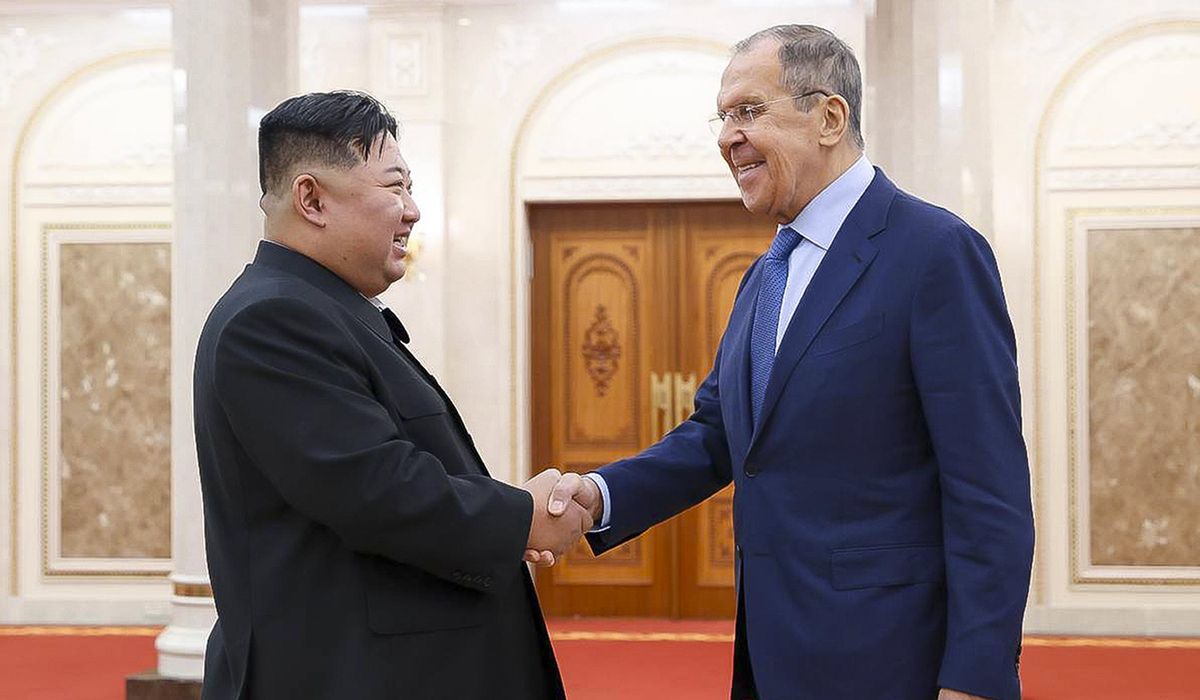


SEOUL, South Korea — In the latest sign of rapidly warming ties, Russian Foreign Minister Sergey Lavrov held talks in Pyongyang this week with North Korean leader Kim Jong-un, hailing what he said was a “qualitatively new strategic level” in bilateral relations.
The diplomatic warning has unnerved both South Korea and the United States, with the Biden administration saying it has already seen signs that Mr. Kim is preparing to offer artillery shells and other military supplies to Russia‘s depleted forces in Ukraine in possible exchange for food, energy and access to sophisticated Russian weaponry.
Noting President Vladimir Putin’s warm summit with Mr. Kim in the Russian city of Vladivostok last month, Mr. Lavrov told reporters in Pyongyang, “We can say confidently that these relations have reached a qualitatively new, strategic level,” according to the official Tass news agency.
Mr. Lavrov did not detail what “strategic” meant and details on his meeting with Mr. Kim have not emerged. But embattled Russia and isolated North Korea have found common cause facing off against U.S.-led democracies worldwide.
The development also has potential implications for the UN Security Council. Russia is a veto-wielding permanent member of the Security Council, which has adopted numerous sanctions against North Korean arms exports.
U.S. government and open-source intelligence outlets strongly indicate that Russia is breaching those resolutions, having allegedly imported hundreds of shipping containers of arms from North Korea in recent weeks.
The Kremlin has denied breaching U.N. sanctions, but Mr. Lavrov’s trip underscored the lack of leverage the U.S. and its allies have to influence either Russia or North Korea these days.
Mr. Lavrov, who arrived in Pyongyang late Wednesday, is the third top Russian official to engage with North Korea this year, after a long period in which Moscow kept its unpredictable, nuclear-armed neighbor at arm’s length.
Defense Minister Sergei Shoigu visited Pyongyang in July, just months ahead of the Putin-Kim summit in September.
Mr. Lavrov warned his hosts Wednesday about what he called Japanese and U.S. “hegemony” in the region and called Russia’s invasion of Ukraine “a war that the West, led by the United States, has unleashed against the Russian Federation with the direct involvement of an overtly Nazi Ukrainian regime.”
Some analysts say Mr. Lavrov is laying the groundwork for Mr. Putin to visit Pyongyang later this year. All indications are that relations are surging.
Until this month, North Korea’s support for Russia had been in the diplomatic sphere. But in recent days, the White House, the website Beyond Parallel and the London-based Royal United Services Institute have all released satellite images of shipping containers moving from North Korea to Russia.
Both sides stand to benefit from upgraded ties.
Russia’s artillery arm in Ukraine has struggled to keep up supplies of shells. This week, unconfirmed open-source intelligence analyses from Ukraine claim that Kyiv’s artillery was outshooting Moscow’s gunners for the first time since the invasion began in February 2022.
Pyongyang is believed to maintain massive stocks of the Warsaw Pact-ear munitions still used by Russia’s army, including 152mm howitzer shells, 122mm tactical rockets and 120mm and 82mm mortar bombs.
In return, Mr. Kim‘s economically ravaged and sanctioned regime could get access to Russia‘s massive grain and energy markets. And Pyongyang may be seeking more.
“Russia wants to deliver something to eat, and oil or gas,” said Joo Eun-sik, president of the Korea Research Institute for Strategy. “But Kim wants to receive Russian technologies — especially satellite technologies, atomic reprocessing technologies and a small reactor for atomic submarines.”
One leading South Korea analyst said Thursday there is little outsiders can do to head off the burgeoning alliance
“What can you do?” said Moon Chung-in, a prominent academic who advised the Seoul governments that engaged with Pyongyang. “North Korea and Russia are already under sanctions, I cannot see what kind of additional sanctions can be imposed. It’s beyond control.”
Russia‘s seat on the U.N. Security Council could prove a factor in the debate, he added.
“I don’t know how far Russia will go,” said Mr. Moon. “If Russia violates U.N. sanction resolutions, that could trigger intense debate on reform of the [Security Council], but there are very few practical measures that the U.S. and its partners can take.”
Mr. Moon frets that the U.S-backed strategy of trying to isolate Mr. Kim‘s regime is not only reducing leverage, but is pushing North Korea, Russia and possibly China together, “fostering new bloc policies in Northeast Asia” and “a new Cold War structure.”
• Andrew Salmon can be reached at asalmon@washingtontimes.com.
